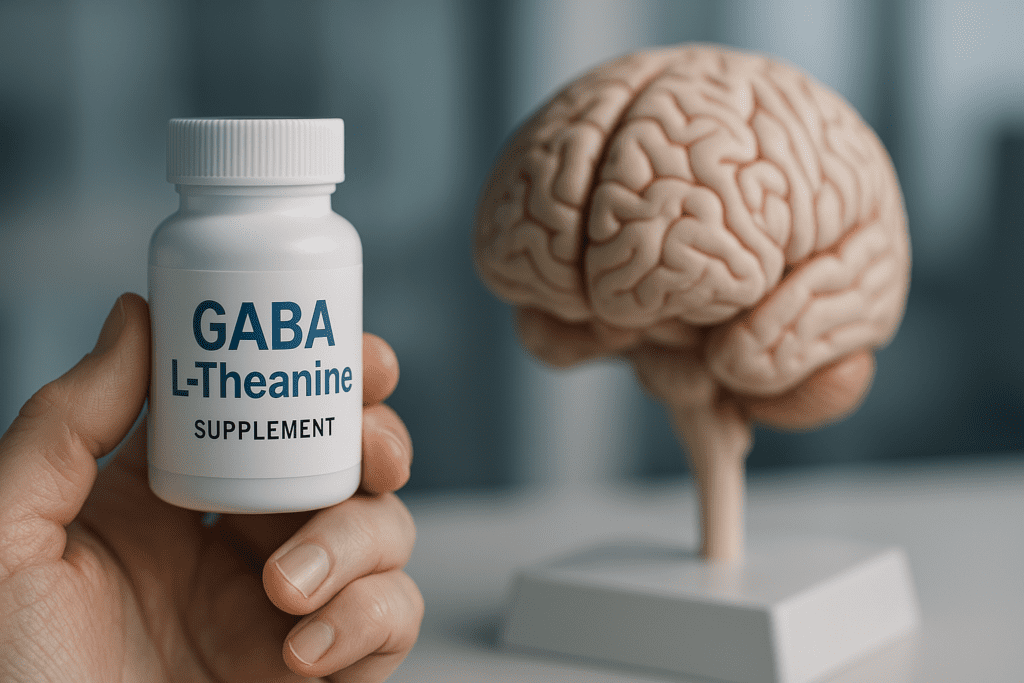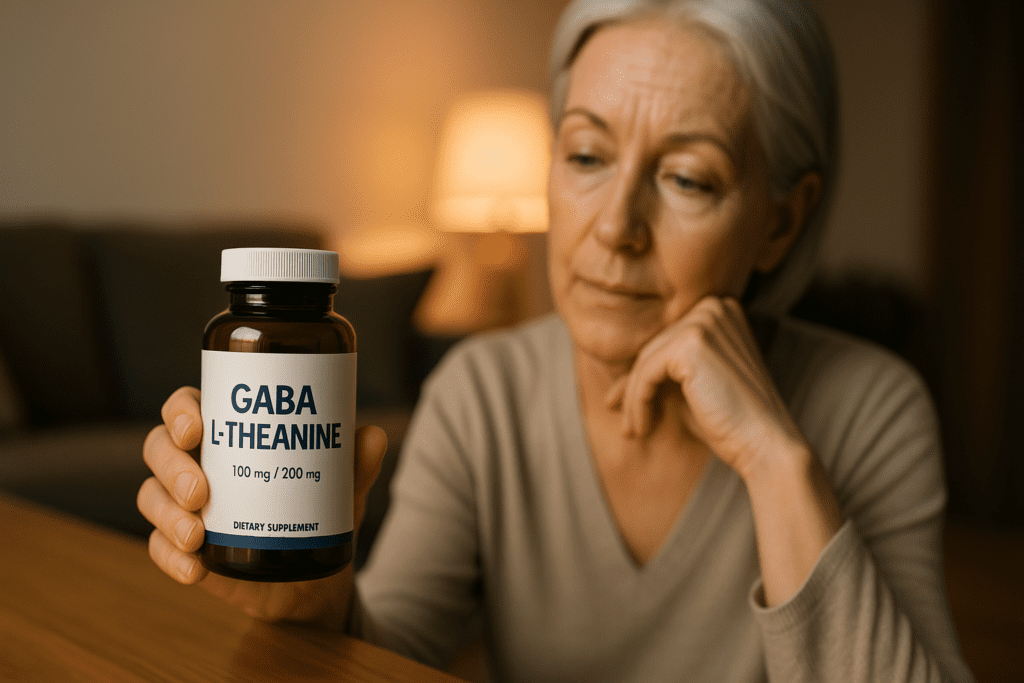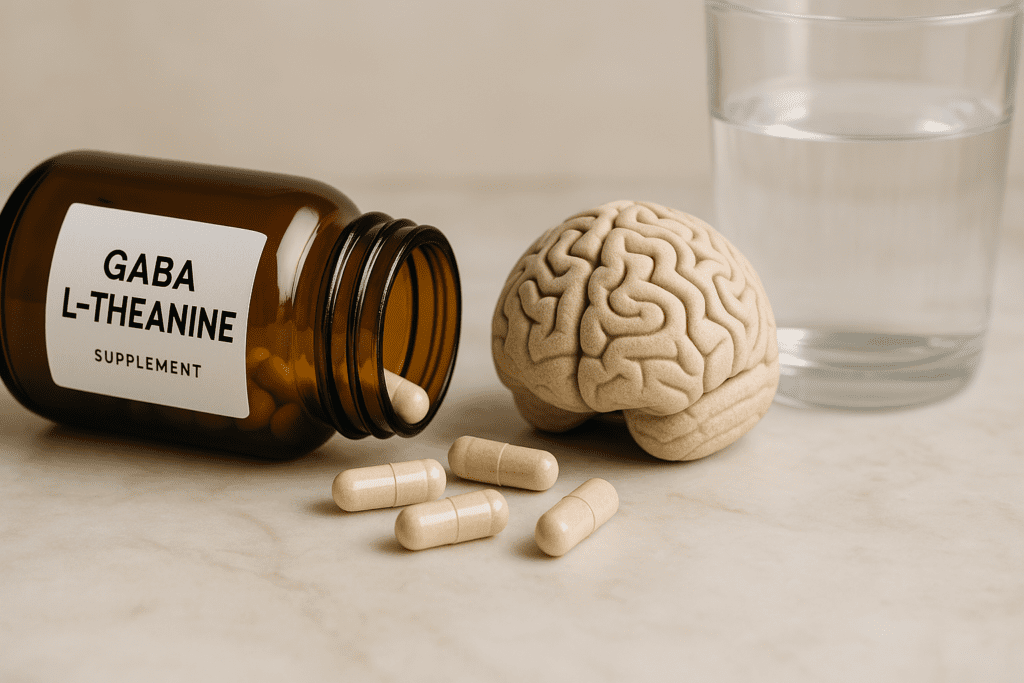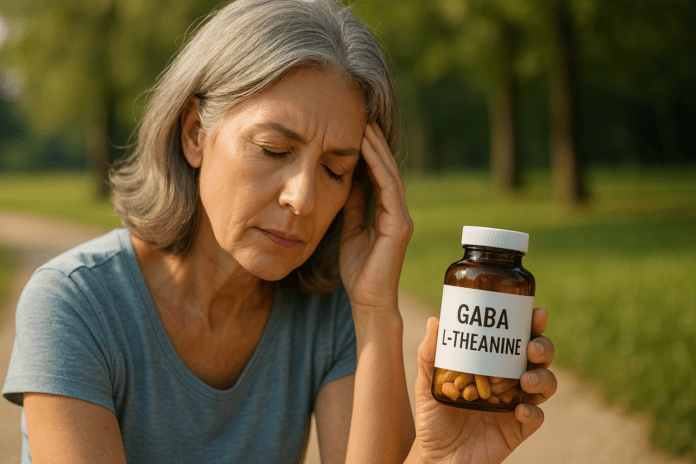In recent years, the natural health community has increasingly turned its attention to compounds like GABA and L-theanine. These two substances, frequently discussed in the context of mental health and stress reduction, have sparked growing interest not only for their well-documented benefits in alleviating anxiety but also for their potential to support long-term cognitive vitality. As the lines between mental well-being and cognitive longevity become more clearly defined through neuroscience, many are asking: can using GABA and L-theanine for anxiety also extend to benefits in brain aging and overall cognitive function? This article delves into the scientific literature to explore the dual action of these compounds, examining whether they hold promise not just for emotional balance but for protecting and enhancing the aging brain.
You may also like: Best Rated Nootropics for Brain Health: Top Supplements to Enhance Focus, Memory, and Longevity
The search for safe, effective, and natural ways to ease anxiety has led many people to explore supplements that work with the brain’s own biochemistry. Among the most promising of these are GABA (gamma-aminobutyric acid) and L-theanine, two compounds widely known for their calming effects. But beyond their role in reducing stress, a growing body of scientific research is asking a deeper question: can GABA and L-theanine for anxiety also promote long-term brain health and cognitive longevity? As we explore this topic, we’ll unpack what the latest science reveals about their role in supporting mental clarity, protecting against age-related decline, and fostering a healthy, resilient brain.
Understanding GABA and L-Theanine: A Biochemical Overview
Gamma-aminobutyric acid (GABA) is the brain’s primary inhibitory neurotransmitter, critical for modulating neuronal excitability and maintaining emotional balance. It acts like a braking system in the nervous system, counteracting the effects of excitatory neurotransmitters such as glutamate. High levels of GABA activity are associated with a calm mental state, reduced stress response, and improved sleep—functions that are disrupted in anxiety disorders. It promotes alpha brainwave production, the same waves associated with deep meditation and creativity, offering a state of calm alertness rather than drowsiness. This makes its anxiolytic effects smoother and more conducive to daytime use, especially for those seeking relaxation without drowsiness.
While both GABA and L-theanine support relaxation, their mechanisms of action differ significantly. This has sparked much interest in the comparison of L-theanine vs GABA when it comes to their unique contributions to mental health. GABA works directly as an inhibitory neurotransmitter, meaning it immediately reduces neuronal excitability where it is active. It produces a calming effect often described as tranquil or even sedating, particularly when taken in higher doses. L-theanine, by contrast, is more nuanced in its action. Rather than acting as a direct neurotransmitter, it modulates several key systems in the brain. L-theanine also interacts with the glutamate system, balancing excitatory signals, while gently increasing levels of GABA and serotonin.
GABA and L-Theanine for Anxiety: What the Evidence Shows
Anxiety disorders affect nearly one-third of adults at some point in their lives, and pharmacological treatments such as benzodiazepines or SSRIs often come with side effects or dependency risks. In this context, the appeal of natural alternatives like GABA and L-theanine has surged. Studies show that both compounds can exert anxiolytic effects without the risk of sedation or cognitive dulling.Similarly, supplementation with GABA has shown promise. While GABA’s ability to cross the blood-brain barrier (BBB) was once questioned, newer evidence indicates that GABA can influence brain function either directly—through limited BBB permeability—or indirectly via the gut-brain axis. Studies show that oral GABA intake reduces markers of stress, including cortisol, heart rate variability, and self-reported anxiety levels.
In clinical trials, L-theanine supplementation has consistently demonstrated the ability to reduce subjective feelings of stress and anxiety. For example, one double-blind, placebo-controlled study found that 200 mg of L-theanine significantly reduced anxiety in individuals exposed to acute stressors. Functional MRI data even suggest that L-theanine modulates brain activity in regions associated with anxiety, such as the amygdala and prefrontal cortex. When taken together, GABA and L-theanine may offer synergistic effects by simultaneously enhancing GABAergic tone and supporting broader neurotransmitter modulation.
Does L-Theanine Lower Cortisol and Stress-Induced Neurotoxicity?
Chronic stress exerts a neurotoxic effect on the brain, particularly in areas like the hippocampus and prefrontal cortex, which are integral to memory and executive function. Elevated cortisol levels over extended periods contribute to neuronal atrophy, reduced synaptic plasticity, and impaired neurogenesis. For this reason, stress-reduction strategies that lower cortisol are of paramount interest in the field of cognitive aging. Additionally, L-theanine’s promotion of alpha wave activity not only enhances relaxation but also improves attentional performance.
One of the most intriguing effects of L-theanine is its ability to lower cortisol in response to stress. Studies have shown that L-theanine supplementation leads to a blunted cortisol response in high-stress scenarios, such as academic exams or social evaluative tasks. This ability to dampen the hypothalamic-pituitary-adrenal (HPA) axis could, over time, reduce the neuroinflammatory and neurodegenerative consequences of chronic stress. These dual effects suggest that L-theanine is capable of shifting the brain out of a hypervigilant, anxious state and into a calmer, more cognitively optimal mode. When used regularly, this shift may reduce cumulative stress load on the brain, potentially preserving neuronal integrity well into later life.

The Role of GABA in Brain Aging and Cognitive Preservation
Beyond its calming properties, GABA plays a central role in brain aging. As we age, the balance between excitatory and inhibitory signaling becomes disrupted, often skewing toward excessive excitation. This imbalance can contribute to cognitive decline, memory problems, and increased risk of neurodegenerative diseases.GABA’s involvement in synaptic plasticity is also noteworthy. Although it is inhibitory, GABA fine-tunes neural circuits and plays a role in long-term potentiation—a cellular mechanism for learning and memory. By improving sleep through GABA supplementation, individuals may further reduce their risk of cognitive decline.
Evidence suggests that maintaining healthy GABA levels may be protective against age-related cognitive decline. In older adults, reduced GABA concentrations have been linked to decreased cognitive performance, especially in tasks involving attention and working memory. By enhancing GABAergic activity, either through supplementation or lifestyle interventions like meditation and exercise, individuals may support a more youthful cognitive profile. This regulatory role makes it a key player in neuroadaptation and cognitive resilience. This regulatory role makes it a key player in neuroadaptation and cognitive resilience.
Additionally, GABA’s impact on sleep quality cannot be overstated. Sleep architecture deteriorates with age, and poor sleep is a well-established risk factor for dementia and other cognitive disorders. GABAergic activity promotes slow-wave sleep, the most restorative phase of the sleep cycle.
Comparing L-Theanine vs GABA: Differences in Function and Application
While GABA and L-theanine share overlapping effects, particularly in the domain of anxiety reduction, their mechanisms of action and broader implications differ significantly. Understanding these distinctions is crucial when considering their use for cognitive longevity. In contrast, L-theanine works more indirectly but across a wider spectrum of neurotransmitters. This broader mechanism may explain why L-theanine also improves attention, focus, and memory, especially under stress. When comparing L-theanine vs GABA in terms of long-term cognitive support, L-theanine may have the edge due to its multi-targeted approach.
GABA acts directly on GABA receptors, exerting immediate inhibitory effects on neuronal activity. This can lead to rapid relief from anxiety and a decrease in physiological arousal. However, because GABA is a neurotransmitter, its effects are relatively short-lived, and its direct impact may depend on an individual’s ability to absorb and utilize the compound effectively. It enhances GABA production and modulates other neurochemicals like dopamine and serotonin. Unlike GABA, L-theanine crosses the blood-brain barrier with ease and exhibits a high degree of bioavailability. However, this doesn’t diminish the value of GABA, especially for individuals experiencing acute stress or struggling with sleep disorders. A combined approach using both compounds might offer complementary benefits.
Synergistic Benefits of GABA and L-Theanine Together
Using GABA and L-theanine together provides an example of how strategic supplementation can leverage the brain’s natural chemistry to achieve both acute and long-lasting benefits. Their combined use may enhance the brain’s resilience to stress, promote emotional stability, and reinforce the neurobiological foundations of cognitive longevity. The combination appears to support both top-down and bottom-up regulation of the stress response. This synergy may allow the brain to remain calm under pressure without sacrificing alertness or decision-making capacity. In this light, using GABA and L-theanine for anxiety is not merely a short-term strategy but potentially a long-term investment in cognitive health. Many users of GABA L-theanine supplements report improvements in mood, focus, and emotional regulation, especially when taken consistently over time.
Scientific studies examining the combined effects of GABA and L-theanine have demonstrated promising results. One study involving individuals under psychological stress found that a GABA L-theanine supplement improved attention and reduced reaction time without causing drowsiness. This is especially relevant given that traditional anxiolytics often impair cognitive performance. GABA acts rapidly on the nervous system to suppress overactivation, while L-theanine facilitates a calmer baseline state through neurotransmitter modulation. GABA directly calms the nervous system, reducing overactivity that can lead to restlessness and poor sleep. In rodent models, GABA and L-theanine supplementation was shown to reverse stress-induced memory deficits and reduce hippocampal inflammation. L-theanine promotes the brain’s own calming and mood-regulating mechanisms, helping maintain equilibrium in the face of daily stressors.
Moreover, the pairing may offer neuroprotective benefits by counteracting the oxidative stress and inflammation associated with chronic anxiety. Both compounds exhibit antioxidant properties and can reduce levels of neuroinflammatory markers. Over time, this may result in better preservation of brain volume, white matter integrity, and synaptic function. This blend is not only beneficial for anxiety, but also shows potential in supporting cognitive longevity. By aligning with the brain’s natural regulatory systems, these compounds may contribute to a trajectory of aging that prioritizes clarity, memory, and mental agility. Combining GABA and L-theanine creates a powerful synergy that leverages the strengths of both compounds. The physiological rationale for this combination lies in the complementary nature of their actions. While human studies are still limited, early trials suggest improvements in sleep, attention, and emotional well-being when both are used concurrently.

Neuroplasticity, Emotional Resilience, and Lifelong Brain Health
Neuroplasticity—the brain’s ability to reorganize and form new neural connections—is fundamental to learning, memory, and recovery from injury. As we age, this capacity tends to decline, but research shows that interventions aimed at stress reduction and neurotransmitter balance can help preserve neuroplastic potential. Chronic stress can shrink the hippocampus and impair neurogenesis, while calm, regulated emotional states are linked with robust cognitive outcomes. Lifelong brain health is not only about avoiding disease but also about optimizing function. This means preserving attention, creativity, emotional intelligence, and the capacity to learn new skills.
GABA and L-theanine, through their influence on neurotransmitter systems, are implicated in supporting neuroplasticity. L-theanine’s enhancement of alpha brainwave activity is associated with increased creativity and learning capacity, while GABA’s role in long-term potentiation supports memory consolidation. Emotionally resilient individuals tend to fare better cognitively in old age, and resilience itself is partly a function of neurochemical regulation. By enhancing emotional regulation through GABAergic and theaninergic pathways, individuals may cultivate a neuroenvironment conducive to both resilience and plasticity. The use of a GABA L-theanine supplement may represent one avenue for fostering these traits over the lifespan.
How GABA and L-Theanine May Influence Cognitive Longevity
Cognitive longevity refers to the brain’s ability to remain sharp, focused, and resilient well into old age. While anxiety relief is often the initial motivation behind using GABA and L-theanine, researchers are increasingly looking at whether these compounds can do more than provide short-term calm. The question is no longer just whether they help with stress, but whether GABA and L-theanine for anxiety also contribute to protecting the brain over time. The interaction between these two compounds becomes even more powerful when considering their combined effects on sleep. Quality sleep is a cornerstone of cognitive health, facilitating memory consolidation, synaptic pruning, and glymphatic clearance. Comparing GABA vs theanine, it’s clear that both have valuable roles, but they serve slightly different purposes. L-theanine, on the other hand, may be better suited for ongoing use to support mental clarity, reduce reactivity to stress, and enhance cognitive flexibility.
One of the most intriguing areas of study involves the role of chronic stress in cognitive decline. High stress levels are associated with elevated cortisol, hippocampal atrophy, and increased risk of neurodegenerative diseases. L-theanine’s ability to promote relaxation and reduce cortisol levels may offer a neuroprotective effect. In fact, the question “does L-theanine lower cortisol?” has been the focus of several studies, many of which show that this amino acid can indeed blunt the physiological stress response. By lowering cortisol and reducing systemic stress, L-theanine may help preserve brain volume and protect memory centers like the hippocampus. GABA and L-theanine together support deeper, more restorative sleep by calming the nervous system and promoting the conditions necessary for healthy sleep architecture.
GABA’s contribution to cognitive longevity is equally compelling. As we age, the brain’s inhibitory capacity tends to diminish, leading to increased neural excitability—a risk factor for cognitive decline and neurodegeneration. By supporting GABAergic tone, either directly or indirectly, supplementation may help maintain the delicate excitation-inhibition balance necessary for healthy brain aging. In animal studies, GABA supplementation has been shown to reduce markers of neuroinflammation, oxidative stress, and even improve learning and memory in aged models. In this way, their benefits extend well beyond anxiety, influencing foundational aspects of brain maintenance and repair. GABA may be more effective for immediate anxiety relief, especially when someone is feeling overwhelmed or panicked. When used together, the result is often a harmonious blend of calm and focus, providing immediate relief and long-term mental resilience.
Frequently Asked Questions (FAQ): GABA and L-Theanine for Anxiety and Cognitive Longevity
1. Can combining GABA and L-theanine help manage stress in high-performance work environments?
Yes, using GABA and L-theanine for anxiety management can be particularly helpful for individuals in high-pressure careers. Many professionals experience chronic, low-grade stress that can quietly erode cognitive performance over time. When GABA and L-theanine are taken together, the calming properties of GABA work to reduce overstimulation while L-theanine enhances focused attention—ideal for demanding work scenarios. Beyond simply taking the edge off, this combination can help support sustained concentration and decision-making accuracy without the cognitive dulling associated with pharmaceutical sedatives. In high-stakes fields like finance, medicine, or law, maintaining emotional composure and cognitive clarity under pressure can translate into measurable long-term performance benefits.
2. What’s the difference between how L-theanine vs GABA affect creativity and mental flow?
The debate around L-theanine vs GABA often centers on their respective impact on relaxation, but their influence on creative cognition is just as noteworthy. L-theanine gently boosts alpha brain wave activity, which has been linked to heightened creativity, idea generation, and fluid intelligence. GABA, in contrast, is more focused on damping hyperactivity in the brain, which can be beneficial for reducing anxiety-related mental blocks but may be less directly involved in fostering novel thinking. When used selectively—such as taking L-theanine before a brainstorming session or creative writing task—the effects may be more stimulating than sedating. GABA, however, might be more appropriate when mental clarity is needed after anxiety-induced cognitive fog.
3. Are there risks in taking a GABA L-theanine supplement long-term?
While most people tolerate GABA L-theanine supplements well, long-term use should be guided by personalized health goals and ideally supervised by a healthcare provider. One underexplored factor is how long-term GABA modulation might influence receptor sensitivity or endogenous neurotransmitter balance, especially if other sedative agents are being used concurrently. L-theanine appears to be quite safe over extended periods, with minimal risk of tolerance or dependency. However, people with existing neurological or psychiatric conditions should be cautious, as altering GABA levels could theoretically affect medication effectiveness or interact with brain chemistry in unpredictable ways. The key is to regularly evaluate whether the supplement continues to support cognitive resilience without unwanted trade-offs.
4. Does L-theanine lower cortisol levels even under chronic stress conditions?
Emerging research suggests that L-theanine can indeed reduce cortisol, especially in the context of ongoing psychological stress. The question “does L-theanine lower cortisol?” has been tested in both acute and prolonged stress models, with promising results. In chronic stress conditions, repeated use of L-theanine appears to modulate the hypothalamic-pituitary-adrenal (HPA) axis, effectively blunting the physiological stress response over time. This modulation not only reduces perceived anxiety but may also protect brain structures like the hippocampus from cortisol-induced damage. Combining L-theanine with GABA may enhance this effect, providing both biochemical and psychological buffering during prolonged periods of pressure.
5. Can taking L-theanine and GABA together help reduce age-related memory loss? Taking L-theanine and GABA together may offer more than just short-term relief—it could support the brain’s long-term resilience against aging. The synergy of GABA and L-theanine for anxiety is well documented, but their potential role in neuroprotection is just beginning to gain attention. Aging brains often experience imbalances in excitatory and inhibitory signaling, which can impair memory consolidation. By supporting healthy GABAergic tone and reducing oxidative stress and inflammation, this supplement pairing may help slow age-related cognitive decline. Although more longitudinal human studies are needed, the preliminary evidence from animal models is encouraging for those looking to support memory longevity.
6. Is there a difference in how quickly GABA vs theanine take effect?
Yes, timing can be an important factor when comparing GABA vs theanine. GABA tends to act more quickly, often within 15 to 30 minutes, especially when taken on an empty stomach. This rapid onset can be useful for acute anxiety episodes or for preparing to sleep. L-theanine, while not as fast-acting, tends to build up a more subtle and sustained sense of mental calm over the course of an hour or so. When used together, GABA provides immediate relief while L-theanine maintains longer-lasting support, making this duo ideal for both short-term and enduring stress management needs.
7. How does a GABA L-theanine supplement compare to prescription anxiety medications?
Unlike many prescription anxiolytics, a GABA L-theanine supplement does not typically produce drowsiness, dependency, or tolerance with regular use. Many pharmaceutical medications, especially benzodiazepines, work by forcefully enhancing GABA activity, which can lead to downregulation of natural GABA receptors over time. The combination of GABA and L-theanine works more gently and supports natural neurotransmitter balance without overriding normal brain function. While they may not replace prescription medications for severe anxiety disorders, these supplements can offer a meaningful adjunct or alternative for individuals with mild to moderate symptoms. Additionally, they are often well tolerated in wellness-focused protocols aimed at stress resilience and cognitive preservation.
8. Can athletes or high performers benefit from using L-theanine GABA together? Absolutely. For athletes, the use of L-theanine GABA together offers a way to stay calm under competitive pressure while maintaining peak physical and mental performance. Sports psychology increasingly recognizes the importance of nervous system regulation for reaction time, decision-making, and recovery. L-theanine can support mental focus and stress resilience during competition, while GABA can help in post-exercise recovery by calming the nervous system and improving sleep quality. The combination may also lower cortisol, which is elevated by intense training and can interfere with muscle repair and hormonal balance. By supporting both mental acuity and physiological recovery, this supplement strategy can enhance training outcomes and long-term performance sustainability.
9. What are the social and emotional benefits of GABA and L-theanine for anxiety in everyday life?
GABA and L-theanine for anxiety may also enhance social functioning by reducing the internal noise that often impairs communication and connection. People with social anxiety, performance stress, or emotional volatility may find that this supplement pairing allows for more authentic engagement with others. L-theanine can reduce social reactivity without blunting emotional nuance, while GABA can prevent the overactivation of fight-or-flight responses that often manifest in public speaking or conflict. Together, they support emotional self-regulation in social settings, making interactions more natural and less taxing. This can contribute to a more stable emotional baseline over time, improving both personal relationships and professional networking.
10. How does the effectiveness of a GABA L-theanine supplement vary by individual? Although the benefits of GABA and L-theanine are well supported, individual responses can vary widely based on genetics, gut microbiome composition, lifestyle habits, and even sleep quality. Some people experience noticeable calm and focus within days, while others may need consistent use over several weeks to perceive results. Factors such as baseline GABA levels, chronic stress exposure, and even caffeine intake can all influence how well someone responds to supplementation. It’s also important to note that high doses are not always more effective—optimal benefits often come from a balanced, personalized regimen. Ultimately, incorporating GABA and L-theanine should be part of a broader cognitive wellness strategy that includes nutrition, movement, and rest.

Conclusion: What the Science Really Says About GABA and L-Theanine for Anxiety and Cognitive Longevity
The intersection of mental wellness and cognitive longevity is gaining recognition as a critical frontier in neuroscience and aging research. Compounds like GABA and L-theanine are at the forefront of this movement, offering tools that not only ease anxiety but potentially extend the lifespan of our cognitive faculties. The combined use of GABA and L-theanine for anxiety demonstrates how mood regulation and cognitive preservation can go hand in hand, especially when approached through evidence-based, natural means. So, whether your goal is immediate stress relief, enhanced emotional regulation, or lifelong cognitive preservation, GABA and L-theanine offer a promising, science-backed foundation.
By reducing the physiological burden of stress, modulating key neurotransmitters, lowering cortisol levels, and supporting neuroplasticity, GABA and L-theanine provide more than momentary relief. They lay the groundwork for sustained brain health.
For those comparing L-theanine vs GABA in isolation, the broader benefits may come from using L-theanine GABA together in synergy. Each compound brings unique mechanisms and benefits that complement one another, reinforcing both short-term calm and long-term brain function. As research continues to evolve, one truth becomes increasingly clear: nurturing our neurochemistry with safe, natural compounds like these may be one of the most effective ways to age not just gracefully—but intelligently. The key lies in consistent, informed use guided by a clear understanding of how these remarkable molecules work in tandem to protect the brain, enhance mental clarity, and promote emotional equilibrium throughout the aging process.
natural anxiety relief supplements, calming neurotransmitters, brain calming compounds, cognitive support nutrients, stress resilience techniques, natural stress hormone reducers, amino acids for brain health, herbal mood enhancers, supplements for emotional balance, mental clarity boosters, neurochemical balance strategies, brain longevity nutrition, adaptogens and cognitive health, anxiety and aging connection, mind-body neuroprotection, neural regeneration supplements, focus and relaxation aids, anti-aging brain support, mental performance enhancers, holistic brain wellness
Further Reading:
GABA and l-theanine mixture decreases sleep latency and improves NREM sleep.
Disclaimer
The information contained in this article is provided for general informational purposes only and is not intended to serve as medical, legal, or professional advice. While Health11News strives to present accurate, up-to-date, and reliable content, no warranty or guarantee, expressed or implied, is made regarding the completeness, accuracy, or adequacy of the information provided. Readers are strongly advised to seek the guidance of a qualified healthcare provider or other relevant professionals before acting on any information contained in this article. Health11News, its authors, editors, and contributors expressly disclaim any liability for any damages, losses, or consequences arising directly or indirectly from the use, interpretation, or reliance on any information presented herein. The views and opinions expressed in this article are those of the author(s) and do not necessarily reflect the official policies or positions of Health11News.


